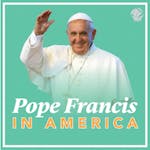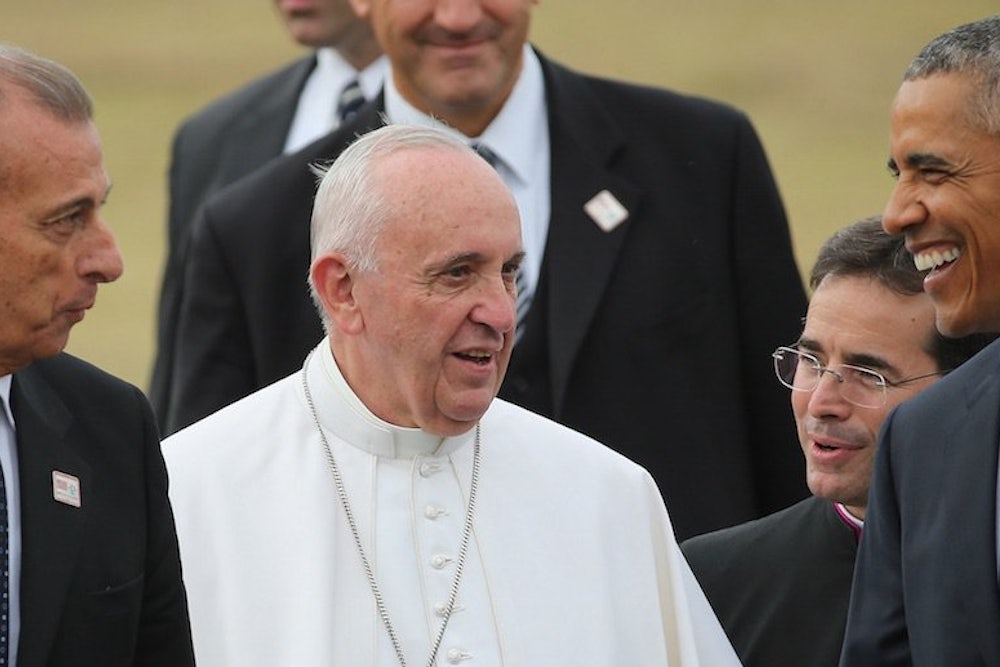
Pope Francis has arrived in the United States for the first papal visit in seven years. Over the next few days, the country will hear his perspective on the state of countless cultural affairs, from climate change to the prison industrial complex to immigration policy. While some of these subjects have been confirmed as points of address on the pontiff's agenda, there's one pressing national concern for which formal remarks have not been announced: racialized police brutality and the Black Lives Matter movement. Should the Pope choose to speak out on the scores of daily police assaults and shootings that stem from racial profiling, it will be his first time addressing systemic racism in the United States. Doing so would mark a turning point in the fight for reform.
Last week, the Washington Post reported that St. Louis reverend Traci Blackmon met with the pope's advisors in Vatican City in June to discuss racial violence and unrest in Missouri and around the country. The visit, which included discussion of the McKinney, TX pool party beating, led Blackmon to believe that the pope could speak out against racism during his visit. “The history of Pope Francis’s remarks indicates that he wouldn’t come to the United States and not address the issue that’s most pressing,” she wrote. “And here, that’s race.”
Given the intensity of racial protest over the past year and the ways that Black Lives Matter has permeated politics, disrupting presidential candidates' stump speeches and forcing public acknowledgement of the threat to and value of black life, a papal address on systemic racism—and police brutality in particular—would make a lot of sense. And it would be a logical extension of past comments he's made on international discrimination and racial injustice.
In 2013, in an address at Jewish Simon Wiesenthal Centre in Rome, Pope Francis called for an end to racism, anti-Semitism and all religious persecution. "The problem of intolerance should be dealt with as a whole: every time a minority is persecuted and marginalised because of his religious beliefs or ethnicity, the good of the whole society is in danger," he said. Then, in a July 2014 letter read at the Mexico-Holy See Colloquium on Migration and Development—a seminar addressing the humanitarian crisis facing Central American and Mexican immigrants—he denounced ill-treatment of Mexican immigrants: "Many people forced to emigrate suffer, and often, die tragically; many of their rights are violated, they are obliged to separate from their families and, unfortunately, continue to be the subject of racist and xenophobic attitudes."
And in matters of American racism, Pope Francis has a large cache of historical apology and denouncement from the U.S. Catholic church to reference. American bishops denounced racial prejudice as immoral for the first time in 1958. In 1979, the United States Conference of Catholic Bishops published a letter calling racism a sin that “divides the human family, blots out the image of God among specific members of that family, and violates the fundamental human dignity of those called to be children of the same Father.” The letter went on to acknowledge the import of black commitment to the faith, in spite of the Church’s failure to take a proactive stance on combating racism:
We have preached the Gospel while closing our eyes to the racism it condemns. We have allowed conformity to social pressures to replace compliance with social justice.
But past mistakes must not hinder the Church's response to the challenges of the present. Worldwide, the Church today is not just European and American; it is also African, Asian, Indian, and Oceanic. [...] A million blacks make Catholicism one of the largest denominations among black Americans today.
And in 1985, Pope John Paul II apologized to African blacks for the Catholic Church’s role in the slave trade. “In the course of history, men belonging to Christian nations did not always do this, and we ask pardon from our African brothers who suffered so much because of the trade in blacks,” he said. “I understand the cry of Africans for an authentic liberation 'far from all racism and all that leads to political, economic or cultural exploitation.” The Vatican would later reaffirm the Catholic Church’s position on furthering racial reconciliation at the United Nations World Conference Against Racism, Racial Discrimination, Xenophobia and Related Intolerance, held in Durban, South Africa in 2001. In a statement on behalf of the Holy See, Archbishop Diarmuid Martin wrote:
Religion has all too often been exploited as a means to further deepen existing political, economic or social divisions. [...] True religious belief is absolutely incompatible with racist attitudes and racist practices. Recent experiences of inter-religious dialogue offer the hope of greater understanding among religions. In many recent conflicts, in fact, the unity shown by religious leaders has been a significant factor in preventing or reducing conflict and in fostering reconciliation.
Though the Conference itself did little to mitigate the historical damage of slavery and racial discrimination, the Pope’s reiteration of the Church’s role in working toward racial harmony remains relevant today.
If Pope Francis publicly speaks on the ongoing problem of police brutality in America, he will continue in the tradition of calling for an end to the racialized violence and injustice that show no signs of abating. He would become a necessary ally in the American fight for freedom—a fight in which spiritual leaders in the U.S., such as Rev. Traci Blackmon, Rev. Starsky Wilson of Saint John’s Church in St. Louis and Pastor Michael McBride of the faith-based Live Free Campaign, who marched and provided spiritual support to protestors in Ferguson last summer, could use his influence, encouragement, and support.
Though Black Lives Matter isn’t a movement primarily driven by the involvement of clergy, as theologian Rahiel Tesfamariam notes at the Washington Post, religious leaders have offered their support, both moral and material, to this ongoing fight for racial justice. Rev. Al Sharpton’s involvement, for instance, has been as repudiated by the movement’s young front-liners as it’s been welcomed in the civil rights protests of previous decades. An endorsement from Pope Francis, as influential as it would be to millions of Catholics and Christians, could reposition religion as an effective tool in this latest fight for racial equality.
